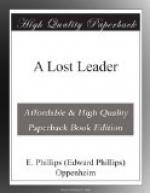“What was that you said just now?” he remarked, “that you were not aware of having an enemy in the world? My dear sir, there was never a more extraordinary delusion. I should seriously doubt whether in the whole of the United Kingdom there is a man who has more. I know myself of a million or so who would welcome the news of your death to-morrow. I know of a select few who have opened, and will open their newspapers to-morrow, and for the next few days, in the hope of seeing your obituary notice.”
A light commenced to break in upon Mannering. He looked towards his companion incredulously.
“You mean political opponents!” he exclaimed. “Is that what you are driving at all the time?”
The man laughed softly.
“My friend,” he said—“excuse me, Mr. Mannering—you remind me irresistibly of Punch’s cartoon last week—the ostrich politician with his head in the sand. You have thrust yours very deep down indeed, when you talk of political opponents. Do you know what they call you in the North, sir?”
“No!”
“The enemy of the people! It isn’t a pleasant title, is it?”
“It is a false one!” Mannering declared, with a little note of passion quivering in his tone.
“It is as true and certain as the judgment of God!” his companion answered, with almost lightning-like rapidity.
There was a moment’s silence. They passed a lamp-post, and Mannering, turning his head, scrutinized the other’s features closely.
“I should like to know who you are,” he said, “and what your name is.”
“It is a reasonable curiosity,” the man answered. “My name is Fardell, Richard Fardell, and I am a retired bookmaker.”
“A bookmaker!” Mannering repeated, incredulously.
“Precisely. I should imagine from what I know of you, Mr. Mannering, that my occupation, or rather my late occupation, is not one which would appeal to you favourably. Very likely not! I don’t see why it should myself. But at any rate, it taught me a lot about my fellow men. I did my business in shillings and half-crowns, you see. Did it with the working classes, the sort who used to go to a race-meeting for a jaunt, and just have a bit on for the sake of the sport. Took their missus generally, and made a holiday of it, and if they lost they’d grin and come and chaff me, and if they won they’d spend the money like lords. I made money, of course, bought houses, and made a lot more. Then business fell off. I didn’t seem to meet with that cheerful holiday-making crew at any of the meetings up in the North, and I got sick of it. You see, I’d made sort of friends with them. They all knew Dicky Fardell, and I knew hundreds of ’em by sight. They’d come and mob me to stand ’em a drink when the wrong horse won, and I can tell you I never refused. They were always good-tempered, real sports to the backbone, and I tell you I was fond of ’em. And then they left off coming. I couldn’t




